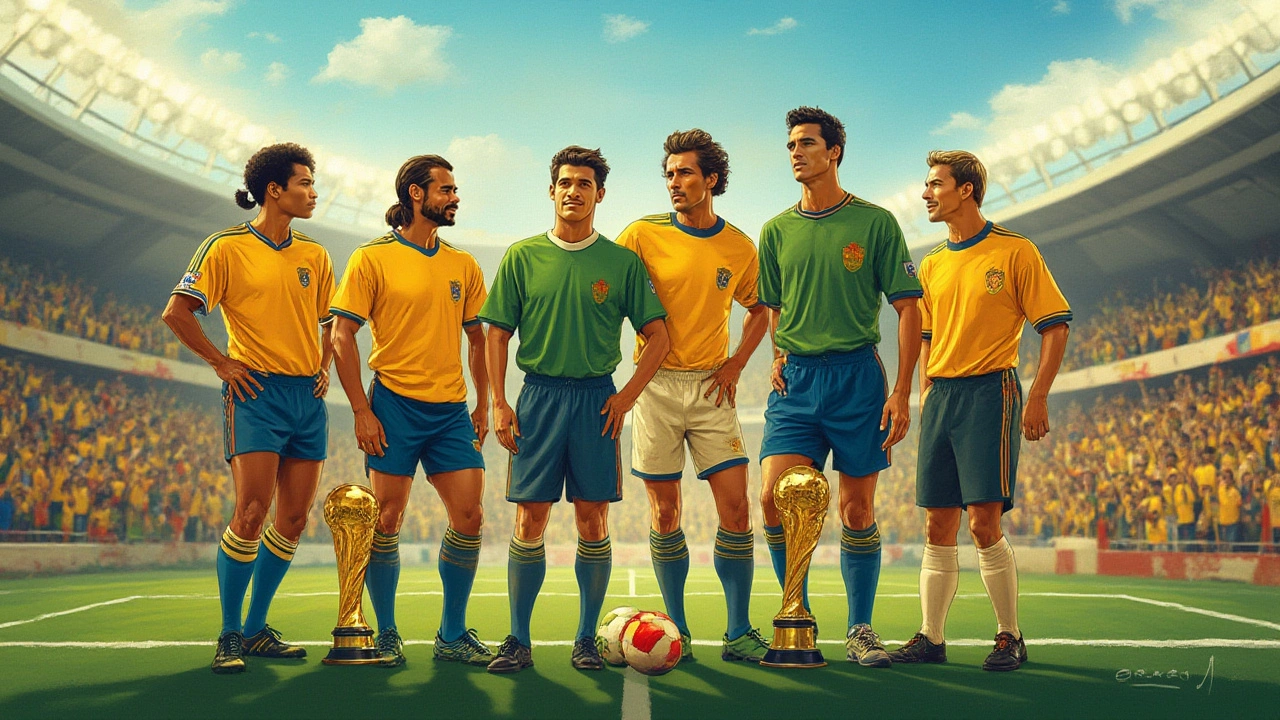Picture a country where game day looks like a national holiday, fireworks echo over city rooftops, and even your grandmother knows the offside rule. That’s not an exaggeration in Brazil. When it comes to sports, Brazil moves to the beat of a soccer ball—or football, as it’s called once you step outside North America. But how did one sport become so woven into the DNA of a massive, diverse nation, and does football really hold the throne unchallenged? Let’s check out how Brazil became synonymous with the beautiful game and take a look at its surprising runs in other sports, too.
How Football Became Brazil’s Pulse
When you think Brazil, you think samba, Carnival, and instantly football. Not just because their teams rock bright yellow kits, but because the sport’s everywhere: on the beaches of Rio, in the alleys of favelas, and in kids’ dreams from the Amazon to São Paulo. Football hit Brazil in the late 1800s, brought in by Charles Miller, a Brazilian of British descent who loved the game so much he stuffed two footballs in his suitcase when he returned from studying in England. At the time, the country was already mad for physical activities, but football’s magic just clicked. Maybe it’s because the game was simple—one ball, anywhere you want to play, no fancy equipment. Or maybe it grew because it brought together rich and poor, city and countryside, molding a sense of unity rare in such a massive country.
The Brazilian passion for football boils down to more than trophies. It’s about dribbling past setbacks. By the 1950s, the country had already transformed the European style. Brazilians added flair, creativity, dazzling moves like the “drible da vaca,” and the kind of swagger that turns a soccer game into a street party. The 1958 World Cup cemented Brazil as football’s spiritual home. That squad showed the world their unique joy and rhythm, and Pelé, just 17, scored a hat trick in his first World Cup semifinal. Since then, Brazil’s brigade of legends—Garrincha, Zico, Romario, Ronaldo, Ronaldinho, and Neymar, to name-drop a few—raised the bar higher for everybody else. Winning is important, and with five FIFA World Cup trophies, Brazil’s men’s squad has clocked more victories than any nation. Their flair isn’t limited to men’s football; the women’s team, too, has made deep runs at World Cups and the Olympics, producing icons like Marta, who’s considered by many as the best female footballer ever.
What makes Brazilian football so hypnotic? The style—often called "joga bonito" (the beautiful game)—mixes skill, improvisation, and sheer audacity. It’s more than just tactics; it’s personality and creativity, shaped on gritty futsal courts and sandy stretches. Many of Brazil’s stars got their start with a barefoot ball, learning close control that street soccer demands. Ask any Brazilian, and they’ll say these small-sided games forge both feints and fearlessness. By the time a teen makes it to the national league, they have a distinct flavor—showboating included! The club system, especially the likes of Flamengo, Corinthians, and Santos, produces a constant stream of talent, and Brazil exports footballers to every corner of the globe. It’s hard to exaggerate the economic roll-on: football jobs, merchandise, and TV rights pour billions into the country. With all this in mind, it’s no wonder football isn’t just a pastime—it’s a calling.
But things aren’t perfect. Pressure on young prospects can get crazy—a dozen pairs of eyes trail a 12-year-old prodigy. Corruption, volatile finances, and stadium violence occasionally cast shadows. The World Cup heartbreaks sting worse than you’d guess, and ups-and-downs in management don’t help. Still, Brazilians shrug it off, turning every stumble into a samba. On the upside, the explosion of women’s football in the last decade has been spectacular. Tournaments are drawing larger crowds, and female athletes inspire hope in young girls who might’ve been told football was “just for boys.” If you tour Brazil during a tournament, you’ll see the game stopping entire cities. Businesses close, streets are deserted, then erupt after a goal—strangers hugging, fireworks, everything. Football over there isn’t a hobby; it’s a public good.

Beyond the Ball: Brazil’s Other Athletic Passions
If you stopped reading after football, you’d be missing a big chunk of what makes Brazil remarkable in sport. Think about volleyball. Since the 1990s, Brazilian volleyball teams—men and women—have become Olympic juggernauts. The men clinched back-to-back golds in the 2000s and silver more times than rivals would care to count. The women’s team, led by legends like Sheilla Castro and Fabiana Claudino, bagged gold at the 2008 and 2012 Olympics and have clocked more podium finishes at World Cups and World Championships. It’s not just indoors, either: beach volleyball is a national obsession, and the pairs of Emanuel/Ricardo and Larissa/Juliana have dominated sandy courts worldwide, with medals piling up since Atlanta ‘96. Most Brazilian towns and cities have public courts right next to the shore—where you’ll see kids launching themselves at flying serves from sunup to sundown.
Then there’s mixed martial arts (MMA) and combat sports. Brazil gave the world jiu-jitsu, which swept through the global fight scene thanks to the legendary Gracie family. Before MMA became a Vegas show, Brazil was running “vale tudo” matches—no-holds-barred scraps that birthed UFC legends like Anderson Silva and José Aldo. Even in boxing, Brazil surprised the world: in 2016, Robson Conceição snagged Olympic gold, a first for the country. Capoeira, a mix of martial art and dance, won’t win Brazil any Olympic medals but sure wins on street cred—for energy, rhythm, and athleticism.
Athletics don’t lag far behind. Long-distance running, especially marathons, gets massive local crowds thanks to high-profile races in Rio and São Paulo. And Formula 1? Brazilians adore it. Ayrton Senna is still mourned and celebrated with murals, songs, and even t-shirts decades after his time behind the wheel. Brazil continues to spawn F1 drivers, and the Interlagos circuit rings with fans waving green-and-yellow flags whatever the standings. Basketball had its time, too; in the 1960s and again in the early 2000s, Brazil’s teams battled giants and left a mark. Oscar Schmidt, the country’s “Holy Hand,” was an icon—even scoring more pro points than Michael Jordan, if you count international stats.
None of this happens by accident. Brazil pours resources into sports academies, community programs, and school competitions. Tournaments like the “Jogos Escolares” (School Games) churn out future Olympians. It helps that the climate’s kind for outdoor sports almost year-round, and there’s a general culture of physical activity. For many families, sport is a ladder—kids see football stardom as a ticket out of hardship, sure, but also as a source of pride, identity, and joy. Even less popular sports, like swimming, judo, and gymnastics, have found room in the spotlight. Swimmers like Cesar Cielo have broken world records, and judokas like Rafaela Silva have Olympic gold.
Still, football overshadows almost everything. When a nation celebrates its holidays with a ball and a goalpost, and most of its kids can name their football heroes before they can spell their names, it’s clear where the heart beats loudest. But beneath that pulse is a broad and surprisingly strong body of sports, just waiting to surprise anyone who pegs Brazil as a one-sport nation.

What Makes Brazil’s Sporting Culture Unique and What You Can Learn
Here’s something that might surprise you: it’s not just talent that makes Brazil stand out. The secret sauce? It’s about how Brazilian culture wraps itself around sport and never lets go. Whether it’s a makeshift field in the Amazon, a volleyball court in Recife, or a martial arts dojo in Rio, what ties it all together is community. Brazilians make sport inclusive. There’s no gatekeeping on the beach, no judging kids for scuffed shoes. Anyone can join a pickup game, and that open-armed spirit fuels skill growth and national pride.
If you’re looking for takeaways, there’s a lot to steal from Brazil’s playbook. Want to raise passionate athletes? Start them young—let them play everywhere, not just in strict training camps. Brazil’s best footballers and volleyball stars learned their craft in the wild, outside, with friends and family, long before anyone put a whistle to their lips. Permit creativity, don’t snuff it out. Coaches in Brazil—even at the grassroots—often encourage players to play with style. Flicks, tricks, improvisation—these are celebrated, not squashed. Talent is important, but mentality is everything. Failures, missed penalties, broken dreams—these don’t end careers for most. The Brazilian way is to bounce back with a smile, laugh it off, and keep fighting. That resilience, that joy in the game, is infectious.
Brazil doesn’t just watch sports, they live them. Even after crushing losses, the country gets right back up, dusts itself off, and tunes up the drums for the next big game. The country’s diversity also powers its athletic edge. Every region—from the soccer-mad South to the martial arts hubs in the North—has its own sporting superstars, traditions, and heroes. There’s healthy rivalry, but an unbreakable unity when it comes to cheering for Brazil. Festivals, music, dance—they’re all tangled up with sport, creating a celebration unlike anywhere else.
Find a way to visit Brazil during a major tournament, if you ever get the chance. Stay near a beach in Rio or a small town in the Northeast for an authentic vibe. Watch how neighbors become teammates, how strangers break out into song when their team scores. The air’s electric and there’s no faking the vibe. If you play, try joining a beach volleyball match or a futsal game. Don’t worry about being good; just show up. The lesson? Sport there isn’t just for professionals—it’s for everyone. Communities know that sport can be both a break from hardship and a source of hope. For locals, scoring a goal, landing a punch in the ring, or making a leaping volleyball block is more than a stat. It’s proof they belong, that they can rise above, and that joy—even wild, unrestrained joy—matters as much as victory.
So, if you ever wonder what sport Brazil is best at, sure, the answer’s football, hands down. But remember, you’re also asking what the country is best at feeling: togetherness, perseverance, and making life one epic celebration—often with a ball at their feet and the world watching in awe.
